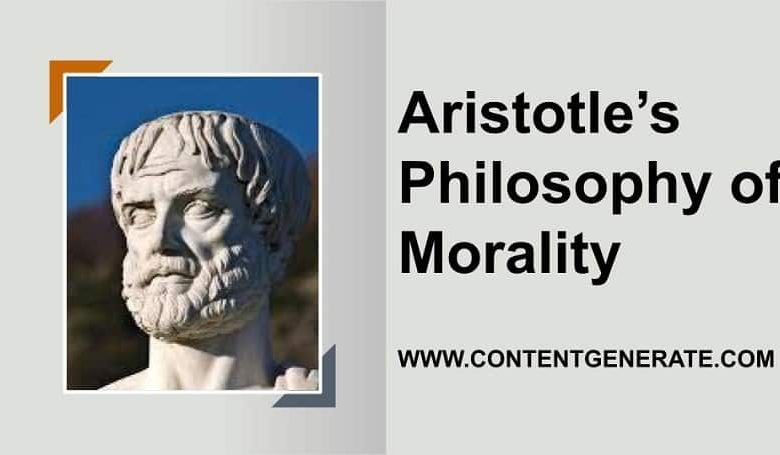
This article presents a brief but comprehensive description of the four cardinal virtues as part of Aristotle’s philosophy of Morality.
Contents
What is Aristotle’s moral theory?
The moral theory of Aristotle is actually the theory of virtue ethics. Aristotle argues a good person is one who possesses virtues. It is not important to see the way a person acts. What is really important is the character that person has. Thus developing virtues as part of a person’s overall character and personality should be the aim of society. In Aristotle’s view, people are not born with virtues, they can only be developed through a continuous process of habit cultivation and training.
What is a virtue according to Aristotle?
According to Aristotle, the term ‘virtue’ refers to a personality trait that a person demonstrates in his/her social conduct. To make it easy Aristotle calls it the mean by reference to two vices, the one of deficiency and the other of excess. To put it in simple words, virtue here means demonstration of moderate behavior.
Let’s take an example of one of the cardinal virtues suggested by Aristotle. Courage is one of the examples of Aristotle’s cardinal virtues.
Would it be a show of courage to resist when a robber pointing a gun at you for your mobile and purse? Looking at the consequences, putting resistance would not be a desirable act. It would be rather an act of foolishness.
Similarly, surrendering to an enemy in a war despite being in a position to fight and win in defense of your land is also an undesirable act. Such an act is an example of lacking courage with the most unwanted consequences for one’s country.
In light of the above example, courage is something that lies between foolhardiness (disregard for danger or consequences) and cowardice.
Main Features of Aristotle’s philosophy of morality
The following are important features of Aristotle’s philosophy of Morality:
1. Happiness is the ultimate aim of life
According to Aristotle, the supreme good and ultimate aim of all human activity is happiness. By supreme good, Aristotle means any human action/activity which is in accord with virtues.
2. Happiness depends on virtuous living and reasoning
For Aristotle happiness refers to a continuous contemplation (studying/observing) of eternal and universal truth. Without the ability of reasoning and virtues, a person cannot be happy. In other words, a happy person is one who has the faculty of theoretical wisdom. Theoretical wisdom here refers to an amalgam of scientific knowledge and intuitive reasoning.
3. Moral virtue is a disposition to behave in the right manner
According to Aristotle, a person can be said to live a moral life if s/he demonstrates moderation in all things. He/she actually keeps a balance between the two extremes of excess and deficiency in their social conduct on daily basis.
Thus moral virtue is, in reality, a disposition of balanced behavior. This suggests that no human action is undesirable if it is regulated by reason in line with a moral principle. Acquisition of moral virtue is not an overnight work, it can only be acquired through contemplation, habituation, and self-discipline.
4. A person is morally responsible for his deeds
According to Aristotle, a virtuous person makes choices on a voluntary based on rational deliberation rather than just assumptions. Thus one cannot be held responsible for such cases which are a product of physical compulsion or unavoidable ignorance.
5. The social environment is a prerequisite for a virtuous life
Aristotle suggested that moral virtues do not become part of one’s character inherently, they are a result of continuous moral action in a social environment. He considers ethics and politics closely interlinked. For him politics creates society and ethics give that society a moral code of conduct for people to develop their full potential for a good life.
What are Aristotle’s Cardinal virtues?
Following are Aristotle’s cardinal virtues that a person must cultivate as a habit in order to live a good and happy life.
1. Prudence (سمجھ داری)
2. Temperance (اعتدال)
3. Courage (ہمت ، حوصلہ)
4. Justice: (انصاف)
1. Prudence
By prudence, Aristotle refers to the practical wisdom that a person should develop as a part of his personality. It is the most important virtue for Aristotle. According to Aristotle prudence is a prerequisite to demonstrate the virtue of courage. Because the latter requires practical judgments before a person acts.
2. Temperance
By Temperance, Aristotle means self-control, and moderation demonstrated both in war and peace, on a collective and individual level, is a virtue.
3. Courage
Courage is the demonstration of moderation with respect to foolhardiness and overconfidence. To put it in simple words, it is an observance of mean with reference to feelings of fear and confidence in daily life.
For Aristotle, the motive of courage is always noble, and the courageous acts in the face of a noble death or act nobly in emergencies that involve death. The opposite of courage is the vices, foolhardiness (rashness), or cowardliness. There are plenty of things that we fear that don’t, won’t, or can’t result in death. If one is courageous, Aristotle says, one will face these fears as reason directs for the sake of noble causes.
4. Justice
By justice, Aristotle refers to actions that are lawful and fair. For him, fairness involves the demonstration of equity and redressal of inequity in day-to-day life. For Aristotle justice is to give your enemy what is due to them in the proper ways. That is how one can be just toward others. Similarly, to be just one must recognize what is good for the community and undertake a good course of action.




